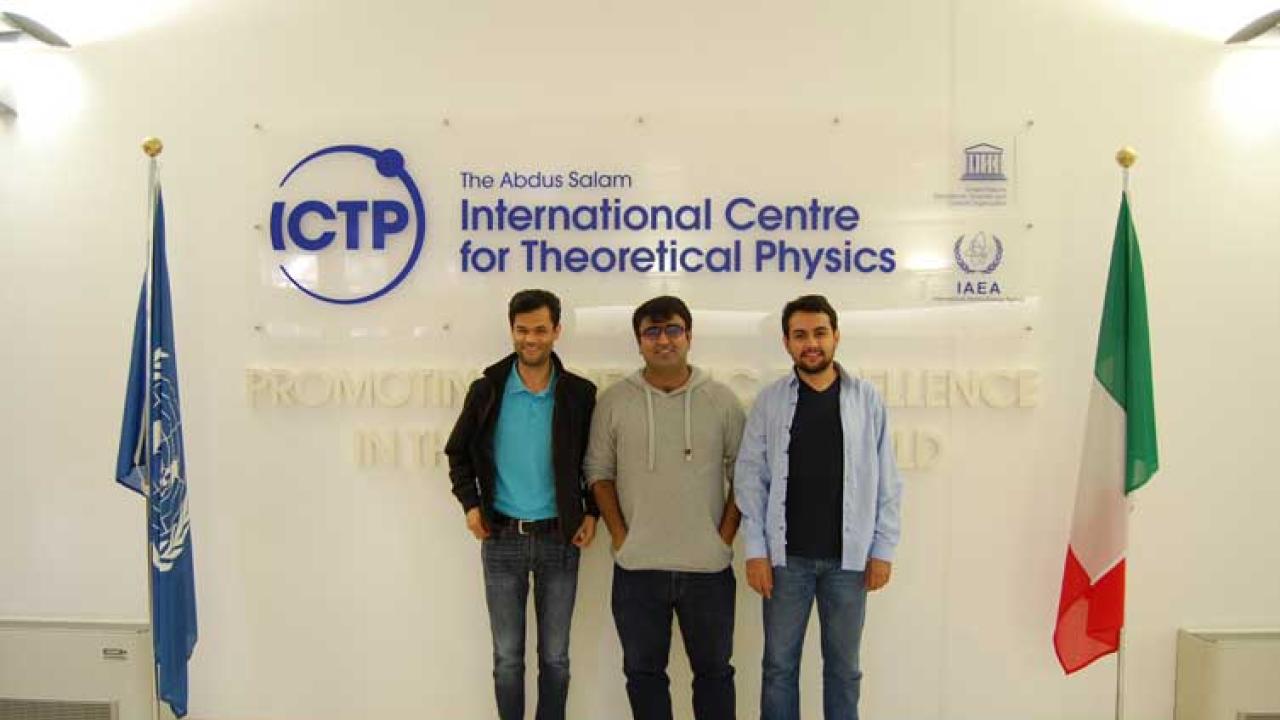
Five ICTP Postgraduate Diploma Programme alumni have successfully completed their doctoral studies in the Joint ICTP-SISSA PhD Programme and have been awarded PhD degrees in physics and mathematics. The five students -- Carlos Mauricio Nieto Guerrero of Colombia, Muhammad Nawaz Qaisrani of Pakistan, Deepak Bahadur Karki of Nepal, William Daniel Montoya Catano of Colombia, and Alaa A. E. Elshorbagy of Egypt-- join an expanding group of highly educated scientists from developing countries trained and nurtured by ICTP.
Their postgraduate educational journey, like the hundreds of other Diploma alumni before them, began with ICTP's year-long, intensive Diploma Programme, which prepares physics and mathematics students from developing countries for the difficult endeavour of completing a PhD. Many Diploma alumni enter PhD programmes all over the world; since 2012, a more local option has been the joint PhD programme with Scuola Internazionale Superiore di Studi Avanzati (SISSA), whose rich mix of specialties and international environment appeal to Diploma students accustomed to the setting. The programme is one of the key ways ICTP works to build scientific capacity in developing science communities around the world.
"Not all PhD programmes in Europe offer courses the way SISSA does, something I liked about this programme," says Nieto Guerrero, one of the graduates from Colombia. "I really liked the Diploma course, and found an advisor here, Roberto Percacci, who helped me connect with a lot of top people in the field, and explores many options for projects." Nieto Guerrero's PhD work focused on exploring fundamental theories in nature that are valid at any energy scale. "We wanted to look at the relation between the standard model and theories of gravity, to take them together," he explains.
The richness of the ICTP learning environment is reflected in Qaisrani's summary of his experience. "I was working with two professors as my advisors, who are teaching me all the time and connecting me with other key people in the field." One of the first PhD students of ICTP scientist Ali Hassanali, Qaisrani also worked with Ralph Gebauer of ICTP, as his project is multidisciplinary. "Ali does molecular simulations, focusing on water, and Ralph is a quantum chemistry guy," says Qaisrani. "My PhD work is part of a collaboration with a neuroscience group in Cambridge, England. I'm looking at amyloid proteins, which are involved in a lot of neurodegenerative diseases. These proteins have unique optical properties- we wanted to find the source of their unexpected fluorescence to understand more about their behavior."
"After the Diploma programme, I wanted to work in geometric analysis," says Elshorbagy, a mathematics graduate from Egypt. "I applied and was accepted to a programme in Canada, but then I realized that there were great researchers here in geometric analysis, so I was excited to stay here." Elshorbagy had to convince her family that traveling to Italy to study was a good idea. "I come from a conservative family, and while I had wanted to travel to study since doing my bachelor's degree, a professor who is an ICTP Diploma alumni as well as the dean of my faculty helped me convince my father that the Diploma programme was a good idea for me." Elshorbagy thrived at the Diploma programme, and stayed to work with ICTP and University of Siena mathematician Giovanni Bellettini. "I wanted to learn from the best," says Elshorbagy.
All five graduates have bright futures ahead of them: postdoctoral positions are the next step for most. "I have a position at the University of Alexandria," says Elshorbagy, adding, "Now that I have my PhD I will be promoted to lecturer, but I would like to continue my training before returning." Elshorbagy will remain at ICTP for the next six months to finish up projects started during her PhD work, and is considering the option of working in industry as well, though one of her dreams is to teach mathematics in Egypt.
Nieto Guerrero was also interested in returning to his home country, Colombia, to teach and perform research: he is now doing a postdoctoral position in Bucaramaga at the Universidad Industrial de Santander. "I'm planning on continuing my training, and I'm interested in both teaching students and the public, exploring science communication," he says.
Qaisrani has accepted a postdoctoral position at the Mainz Institute for Theoretical Physics in Germany. "I want to train enough to be able to go back to lead an independent research group in Pakistan. With this PhD and extended training, I hope that will be possible."
---- Kelsey Calhoun













